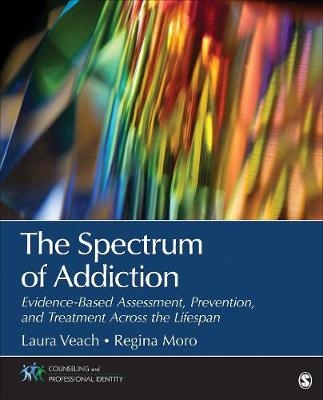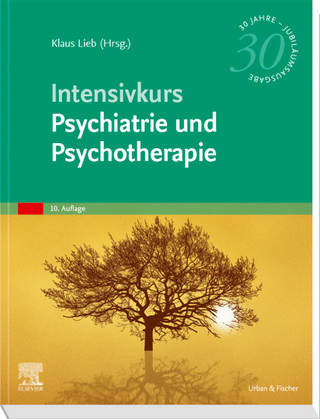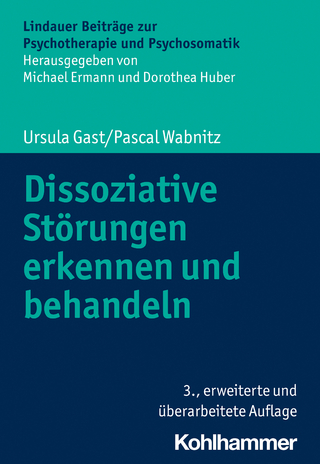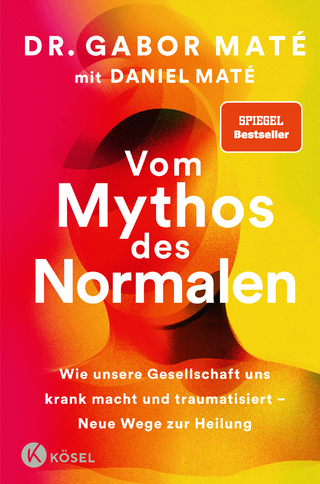
The Spectrum of Addiction
SAGE Publications Inc (Verlag)
978-1-4833-6483-4 (ISBN)
Reflecting the latest content in the DSM–5, The Spectrum of Addiction presents a comprehensive overview of addictive behaviors and habits from early use through risky use, severe-risk use, and addiction. Authors Laura Veach and Regina Moro draw from their experience in both teaching and counseling to provide real-world knowledge and evidence-based practices for working with clients who fall within the spectrum of addiction ranging from experimentation to physical addiction and recovery. With a unique focus on neuroscience, integration of CACREP standards, and extensive coverage of addictions across the lifespan, the book serves as a practical resource for future addiction counselors.
The Spectrum of Addiction is part of SAGE’s Counseling and Professional Identity Series.
Laura J. Veach, Ph.D., Professor in the Departments of Surgery and Psychiatry/Behavioral Medicine at Wake Forest School of Medicine in Winston-Salem, NC is licensed in NC as a professional counselor (LPC), a clinical addiction specialist (LCAS), and is a certified clinical supervisor (CCS). Dr. Veach has her Ph.D. in Counselor Education & Supervision from the University of New Orleans. She serves as the Wake Forest Baptist Health Director of Counselor Training in Acute Care Services: Surgery/Trauma/Burns/Medicine and Specialized Screening and Intervention research and trauma-informed counseling with over 35 years of work in counseling and supervision, especially in counseling individuals impacted by substance use disorders. In August 2007 she pioneered alcohol screening and brief counseling intervention services, research, and counselor training at Wake Forest Baptist Medical Level I Trauma Center. She served as Co-Principal Investigator for a Robert Wood Johnson Foundation Grant examining alcohol screening and brief counseling interventions in a prospective clinical trial comparing two counseling interventions. Recently, she received funding from the Childress Institute for Pediatric Trauma as Principal Investigator to conduct ATV safety interventions with pediatric trauma patients and also completed violence intervention research with violently injured youth in hospital trauma centers at Wake Forest and Carolinas Medical Center. In addition, she is a key care manager for an NIH-funded multicenter pragmatic trial examining intensive PTSD interventions in hospitalized trauma patients. She specializes in counseling individuals with addictive and substance-related use disorders, trauma-informed counseling in medical and integrated care settings, behavioral health consulting, and has over 20 publications. She has over 35 years of clinical, management, and start-up experience in counseling settings. In previous counselor education tenured faculty appointments at Wake Forest University and University of North Carolina at Charlotte and in previous behavioral health administration work she created innovative counselor training, addiction treatment programs and managed care services. Dr. Veach served as the 2006 President of the International Association of Addictions and Offender Counseling (IAAOC). She was awarded the IAAOC Counselor Educator Award in March 2007, the Graduate Faculty Award for Excellence in Teaching at Wake Forest University May 2007, and the national ACA Advocacy Award March 2008. She cherishes spending time with her devoted partner, George, and amazing daughter, Alana, as we enjoy our shared vintage auto racing and travel pursuits in the U.S. Dr. Regina Moro currently serves as an Assistant Professor in the Department of Counselor Education at Boise State University in Boise, Idaho. She received her PhD in Counseling from the University of North Carolina at Charlotte with an emphasis in Multicultural Counseling, received a graduate certificate from UNC Charlotte in Substance Abuse Counseling, and an MS in Community Counseling from Syracuse University. Regina is licensed as a Licensed Mental Health Counselor (FL), a Licensed Clinical Addictions Specialist (NC), and is a National Certified Counselor. Her clinical passion involves work with crisis and trauma, including a focus on addiction with individuals and families. Regina has held leadership positions in Counseling organizations, most recently with the International Association of Addictions and Offender Counselors. She enjoys spending her free time enjoying the great outdoors with her partner, Ryan, and their rescue dog, Barkley.
Preface
Acknowledgments
Chapter 1 Historical Foundations of Addiction Counseling
Learning Objectives
Historical Use of Chemical Substances
History of the Treatment and Recovery Movement
History of Addiction-Related Research
Historical Legislation Efforts Impacting the Field
The Evolving Addiction Treatment Professional
Conclusion
Resources for Further Learning
References
Chapter 2 Understanding the Importance of Evidence-Based Practices for Professional Counselors
Learning Objectives
Overview of Evidence-Based Practices
Defining Evidence-Based
Understanding Research in Action
Importance and Demand for Evidence-Based Practice
Locating Evidence-Based Practices
A Caveat: The Common Factors Model and Evidence-Based Practice
Conclusion
Skills in Action
Resources for Further Learning
References
Chapter 3 Understanding the Brain in the Addictive Process
Learning Objectives
Knowledge: Enhanced Understanding and Brain Research
Evidence-Based Practice
Addiction and Brain Changes
Future Directions
Skills in Action
Case Study
Experiential Skills Learning Activity
Quiz: Brain and Addiction
Answer Key: Brain and Addiction Quiz
Resources for Further Learning
References
Chapter 4 Experimentation and Seeking Altered States
Learning Objectives
Knowledge
Social Pressures: Theories
Social Pressures: Peer, Family, and Community Influences
Family Influences
Gender Influences and Altered States
Cultural Influences
School Influences
Other Influences and College Youth
American Culture
Protective Factors
Successful Community-Based Prevention
Evidence-Based Practice
Skills in Action
Resources for Further Learning
References
Chapter 5 Understanding Risky Use Patterns
Learning Objectives
Knowledge
Risky Drinking
Risky Use of Other Mood-Altering Substances
Risky Use of Prescription Medication
College Students and Binge Patterns: Chemical and Process
Evidence-Based Practices
Identifying Protective Factors and Advocacy
Skills in Action
Resources for Further Learning
References
Chapter 6 Assessment of Risky Use and Addictive Disorders
Learning Objectives
Risky Use
Knowledge
Important Considerations: Laying the Groundwork for Assessment
Rapport-Building and Trust Issues
Assessment of Use Patterns
Evidence-Based Practices
Extensive Assessment Tools
Skills in Action
Resources for Further Learning
References
Chapter 7 Diagnosis of Substance-Related and Addictive Disorders
Learning Objectives
Knowledge
Overview of Current Diagnosis Models
National Institute of Mental Health Research Domain Criteria
International Classification and Diagnosis
DSM-5 and New Updates
Evidence-Based Practices
Skills in Action
Resources for Further Learning
References
Chapter 8 Brief Counseling Interventions
Learning Objectives
History of Brief Interventions
Need and Evolution of the Brief Intervention Model
Definition of Brief Intervention
Evidence-Based Practices in Clinical Settings
Skills in Action
Resources for Further Learning
References
Chapter 9 Intensive Family Interventions
Learning Objectives
Knowledge
Evidence-Based Practices (EBP)
Family Support
Skills in Action
Conclusion
Resources for Further Learning
References
Chapter 10 Societal Systems Impacted by the Addiction Spectrum: Legal, Workplace, and Medical Settings
Learning Objectives
Knowledge
Legal System and the Impact of the Addiction Spectrum
Medical Settings and the Impact of the Addiction Spectrum
Evidence-Based Practices
Skills in Action
Resources for Further Learning
References
Chapter 11 Intensive Addictions Counseling
Learning Objectives
Knowledge
Evidence-Based Practice
Cognitive Behavior Therapy (CBT)
Relational Model
Motivational Interviewing (MI)
Brain Stimulation Approaches
Other Considerations for Intensive Counseling of Individuals With Addictive Disorders
Tobacco
Heroin
Cocaine
Process Addictions
Intensive Levels of Care and Placement Criteria
Skills in Action
Resources for Further Learning
References
Chapter 12 Cross Addictions and Comorbidities
Learning Objectives
Knowledge
Cross Addictions: Evidence-Based Knowledge and Substances
Cross Addictions: Evidence-Based Knowledge and Process Addictions
Cross-Addiction Substance and Process Addictions
Skills in Action: Cross Addictions
Effective Interventions for Cross Addictions
Interventions for Cross Addictions With Emerging Research Support
Comorbidity
Evidence-Based Practices and Comorbidities
Skills in Action: Comorbidity
Resources for Further Learning
References
Chapter 13 Continuing Care and Relapse Prevention
Learning Objectives
Knowledge
Prevalence and Scope of Relapse
Understanding the Importance of Continuing Care to Prevent Relapse
Evidence-Based Practices
Mindfulness
Medication-Assisted Treatment (MAT)
Relapse Prevention Therapy (RPT)
Recovery Communities
Skills in Action
References
Chapter 14 Future Directions for Evidence-Based Addictions Counseling Research
Learning Objectives
Knowledge
Neuroscience and the Brain
An Expanding Definition of Addiction: Behavioral/Process Addictions
Evidence-Based Practices
Holistic Approaches
Building Upon and Re-Examining Established Evidence-Based Models
Importance of Continued Research
Skills in Action
Resources for Further Learning
References
Index
About the Authors
| Erscheinungsdatum | 03.02.2018 |
|---|---|
| Reihe/Serie | Counseling and Professional Identity |
| Verlagsort | Thousand Oaks |
| Sprache | englisch |
| Maße | 187 x 231 mm |
| Gewicht | 640 g |
| Themenwelt | Geisteswissenschaften ► Psychologie ► Persönlichkeitsstörungen |
| Medizin / Pharmazie ► Medizinische Fachgebiete ► Suchtkrankheiten | |
| Sozialwissenschaften ► Pädagogik ► Sozialpädagogik | |
| Sozialwissenschaften ► Soziologie | |
| ISBN-10 | 1-4833-6483-6 / 1483364836 |
| ISBN-13 | 978-1-4833-6483-4 / 9781483364834 |
| Zustand | Neuware |
| Informationen gemäß Produktsicherheitsverordnung (GPSR) | |
| Haben Sie eine Frage zum Produkt? |
aus dem Bereich


